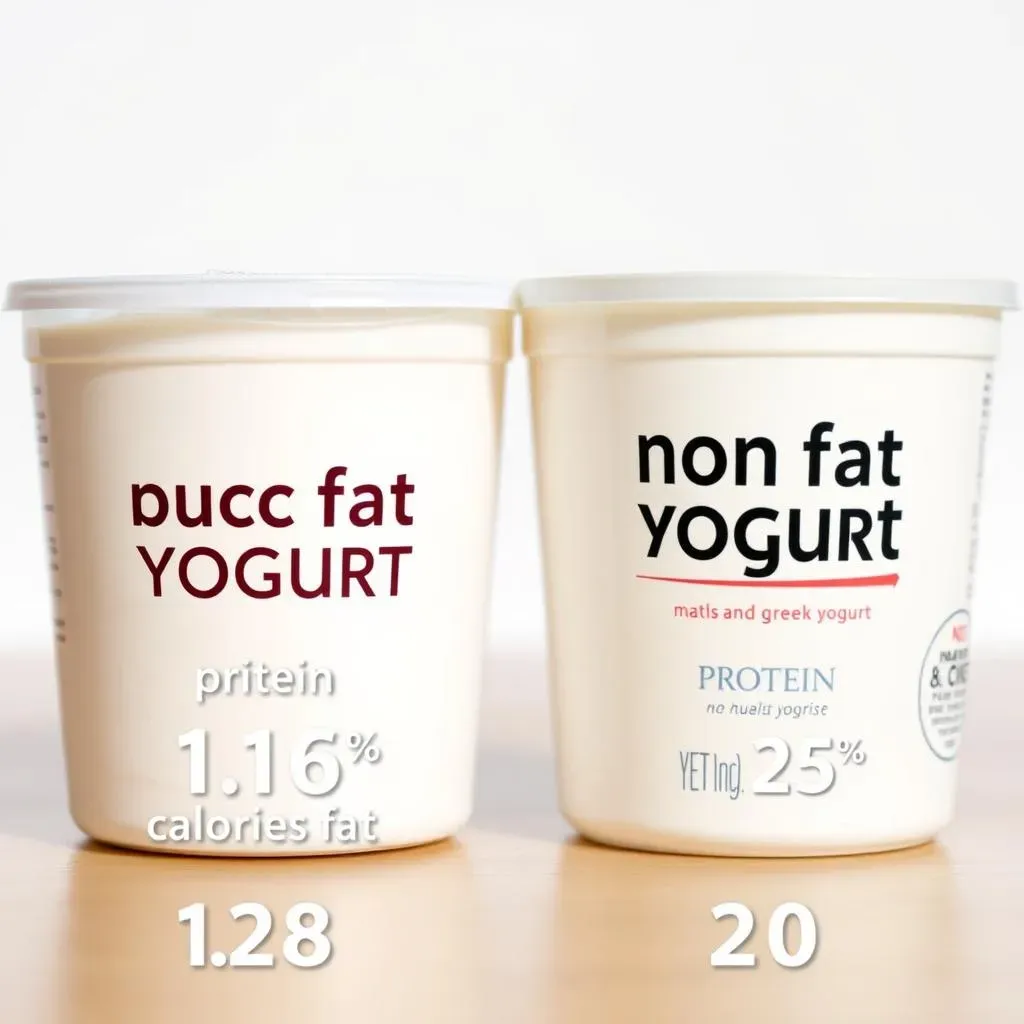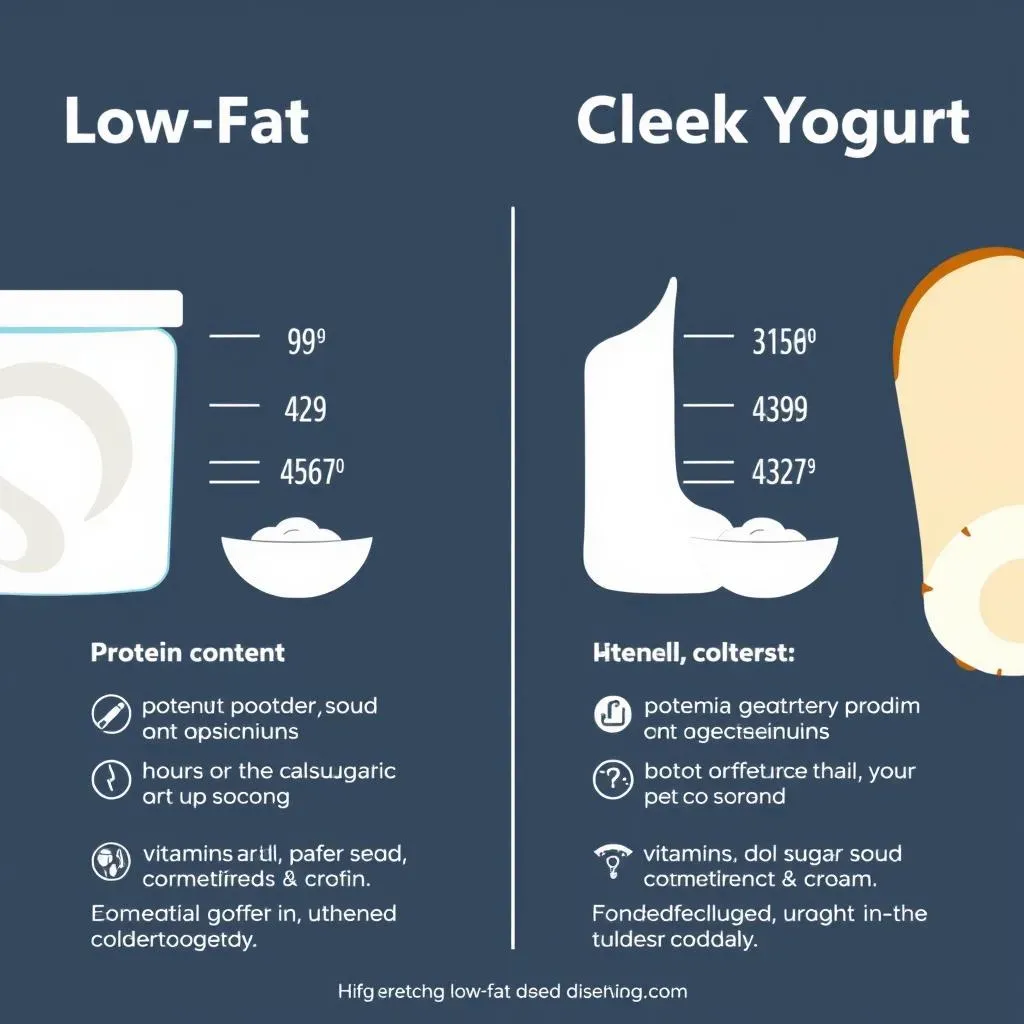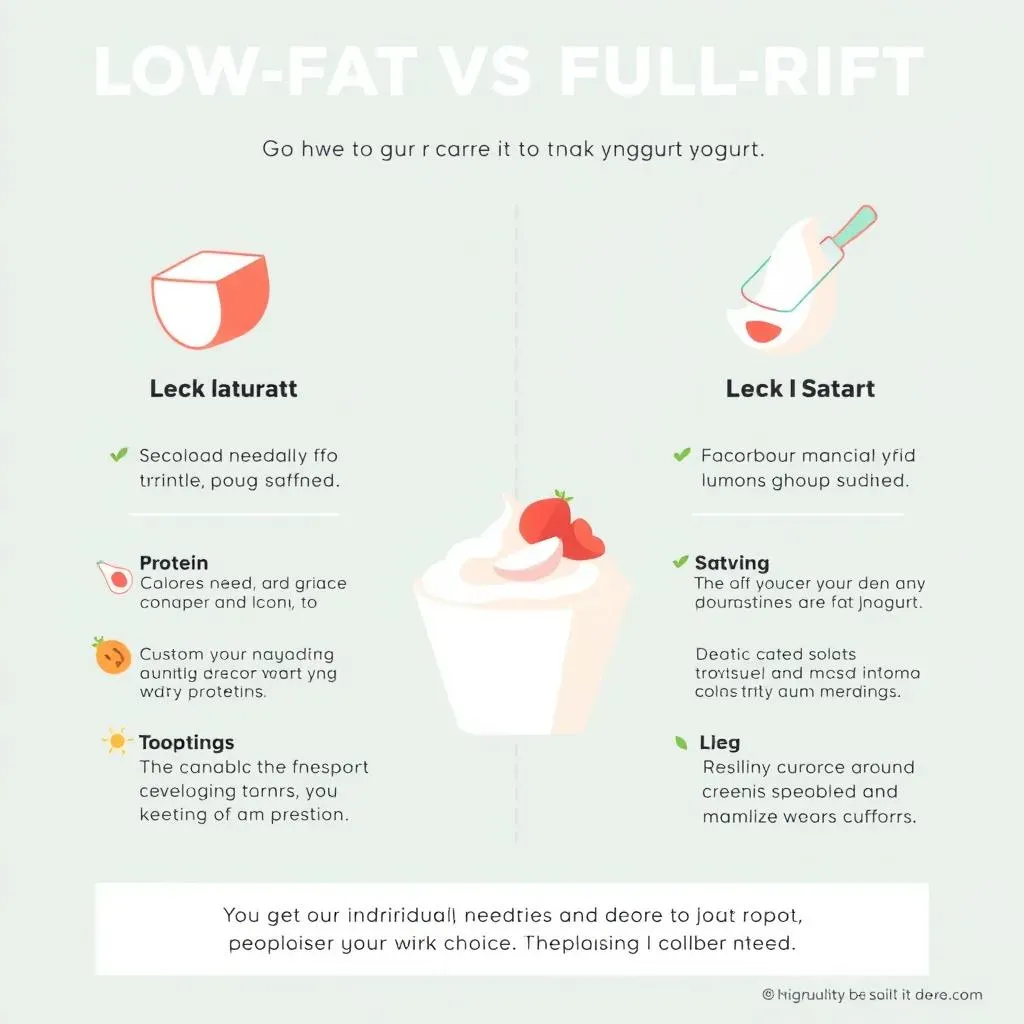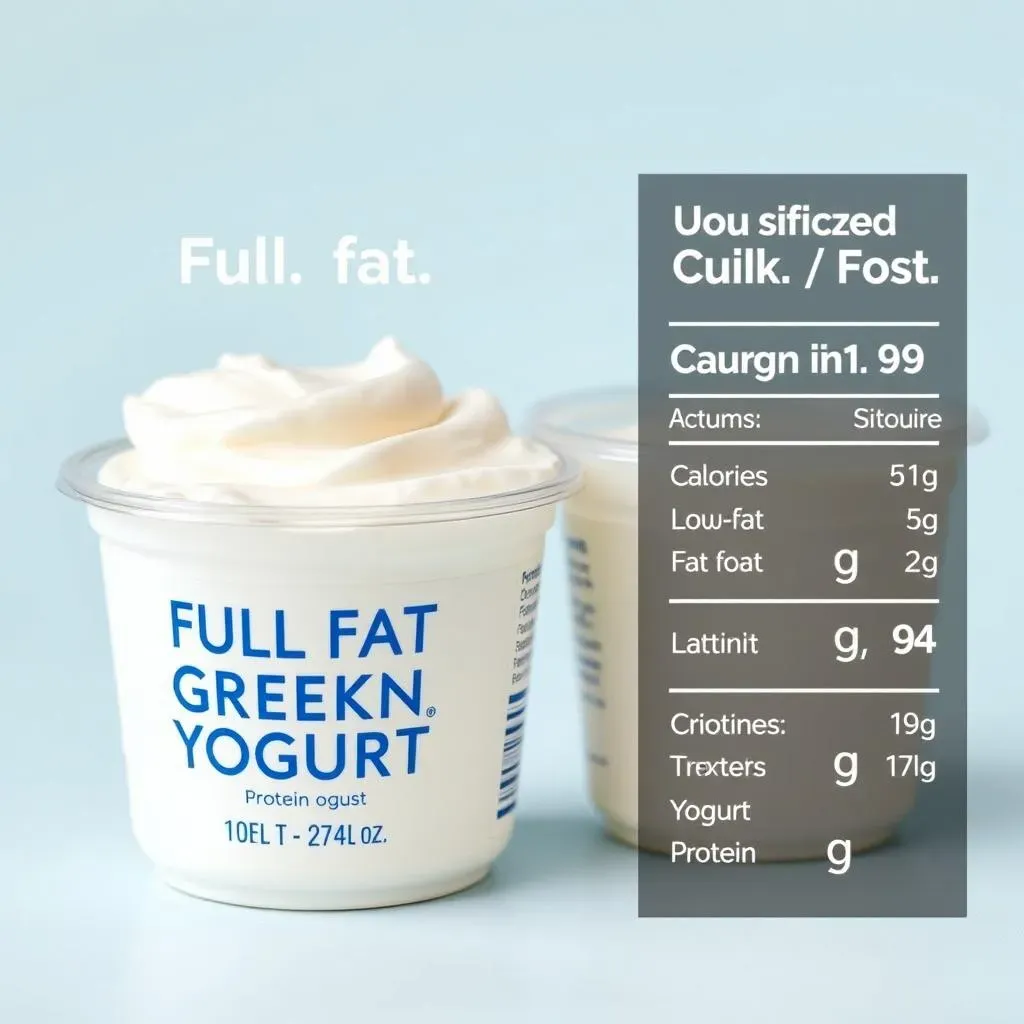Table of Contents
Greek yogurt: it's thick, creamy, and packed with protein. But when you're standing in the dairy aisle, staring at rows of containers, a big question pops up. Is low-fat or full fat yogurt better for you? Both versions boast health benefits, but the fat content is a major difference. Full-fat yogurt uses whole milk, while nonfat starts with skim milk. This changes the calories and the types of fats you're getting. In this article, I'll break down the key differences between nonfat and full-fat Greek yogurt. I will also look at nutrition, saturated fat, and how to decide which one fits your lifestyle. Forget the confusion and get ready to make an informed choice about your yogurt. Let's get started!
Nonfat vs. FullFat Greek Yogurt: What's the Real Difference?

Nonfat vs. FullFat Greek Yogurt: What's the Real Difference?
The Milk Matters: Whole vs. Skim
Greek yogurt starts like regular yogurt, but then it goes through an extra step. That extra step is straining. Straining removes the whey, that liquid-y part, which makes it thicker and gives it more protein. The big difference between nonfat and full-fat Greek yogurt is the type of milk used. Full-fat uses whole milk, so it keeps all those milk fats. Nonfat uses skim milk, where the fat's been removed. That simple switch changes everything about the final product.
Calories and Macros: A Quick Comparison
Alright, let's talk numbers. A typical 6-ounce (170g) container of full-fat Greek yogurt rocks around 190 calories. Most of those calories come from protein and fat. Nonfat Greek yogurt, on the other hand, sits around 90-100 calories for the same size. It's lower in calories because, well, there's no fat! Both types are protein powerhouses, packing about 18 grams per container. This high protein-to-carb ratio is why Greek yogurt is a winner for keeping you full and satisfied.
Nutrient | Full-Fat Greek Yogurt (6 oz) | Nonfat Greek Yogurt (6 oz) |
|---|---|---|
Calories | ~190 | ~90-100 |
Protein | ~18g | ~18g |
Fat | ~10g | 0g |
Taste and Texture: It's a Feel Thing
Here's where personal preference really kicks in. Full-fat Greek yogurt has a richer, creamier texture. That fat adds a certain something that makes it feel more luxurious. Nonfat Greek yogurt can be a bit tangier and sometimes a little thinner. Some people actually prefer that lighter feel. If you're watching calories closely, you might be tempted to automatically reach for the nonfat. But that extra fat in full-fat yogurt can be more satisfying. Leading you to eat less overall. It's all about finding what you enjoy and what keeps you feeling good.
Unpacking the Nutrition: Is LowFat or FullFat Yogurt the Healthier Choice?

Unpacking the Nutrition: Is LowFat or FullFat Yogurt the Healthier Choice?
Beyond the Fat: Vitamins and Minerals
Don't get hung up on just the fat content. Both low-fat and full-fat Greek yogurt bring a lot to the table in terms of vitamins and minerals. You're getting a good dose of calcium, which is crucial for strong bones. Plus, there's potassium, which helps regulate blood pressure. And let's not forget about vitamin B12, important for nerve function and energy. The amounts might vary slightly between full-fat and nonfat, but both are solid sources of these essential nutrients. So, whether you're team full-fat or team nonfat, you're still winning in the vitamin and mineral department.
Protein Power: Fueling Your Body
Protein is the star of the show when it comes to Greek yogurt. As mentioned before, both full-fat and nonfat versions pack a serious protein punch. This is awesome for a bunch of reasons. Protein helps you feel full and satisfied, which can aid in weight management. It's also essential for building and repairing muscle tissue, so it's great after a workout. And protein plays a role in basically every process in your body, from making enzymes to supporting your immune system. Whether you go low-fat or full-fat, you're getting a hefty dose of this vital nutrient.
"Protein is not only the building blocks for our muscles, but also the foundation for a healthy and well-functioning body." - Dr. Jane Doe, Nutrition Expert
Added Sugars: The Real Culprit?
Here's a sneaky thing to watch out for. Many flavored yogurts, whether they're low-fat or full-fat, can be loaded with added sugars. These sugars can quickly negate any health benefits you're getting from the yogurt itself. It's always best to opt for plain Greek yogurt, and then add your own toppings like fruit, nuts, or a drizzle of honey. That way, you're in control of the sweetness and can avoid those unnecessary added sugars. Remember, reading the nutrition label is key! Don't let those hidden sugars sabotage your healthy snack.
- Always check the label: Look for added sugars.
- Choose plain yogurt: Add your own healthy toppings.
- Be mindful of portions: Even healthy foods should be eaten in moderation.
Saturated Fat in FullFat Yogurt: Friend or Foe?

Saturated Fat in FullFat Yogurt: Friend or Foe?
The Saturated Fat Story
Saturated fat has gotten a bad rap over the years, hasn't it? We've been told to avoid it like the plague, linking it to heart disease and all sorts of health problems. But the truth is, the science is a bit more nuanced than that. Full-fat Greek yogurt does contain saturated fat, about 5-6 grams per 6-ounce serving. However, not all saturated fats are created equal. The saturated fats in dairy, like yogurt, might not be as harmful as those found in processed foods or red meat. It's all about the source and the overall context of your diet.
Moderation is Key
So, should you freak out about the saturated fat in full-fat yogurt? Probably not. The key is moderation. If you're eating a balanced diet with plenty of fruits, vegetables, and lean protein, a little saturated fat from yogurt isn't going to derail your health. In fact, some studies suggest that full-fat dairy might even have some benefits. Like helping you absorb certain vitamins or keeping you feeling fuller for longer. Of course, if you have specific health concerns, like high cholesterol, it's always best to chat with your doctor or a registered dietitian.
“Everything in moderation, including moderation.” - Oscar Wilde (kinda applicable here!)
- Balance: Consider saturated fat intake within your entire diet.
- Listen to your body: Pay attention to how different foods affect you.
- Consult a professional: Seek advice from a doctor or dietitian if needed.
Making the Right Choice: How to Decide If LowFat or FullFat Yogurt Is Best for You

Making the Right Choice: How to Decide If LowFat or FullFat Yogurt Is Best for You
Your Calorie Needs: Finding the Right Balance
Alright, let's get real. The best yogurt for you really depends on your individual calorie needs and dietary goals. If you're trying to lose weight or are carefully tracking your calorie intake, nonfat Greek yogurt might seem like the obvious choice. It's lower in calories, so it can help you stay within your daily limits. However, remember that calories aren't everything. If you find that the full-fat version keeps you more satisfied. Preventing you from snacking later, it might actually be a better choice for weight management in the long run.
Toppings and Extras: The Whole Package
Don't just think about the yogurt itself, consider what you're adding to it! A plain, nonfat Greek yogurt can quickly become a calorie bomb if you load it up with sugary granola, chocolate chips, and honey. On the other hand, a small serving of full-fat Greek yogurt with some berries and a sprinkle of nuts can be a perfectly satisfying and nutritious snack. Think about the whole package, not just the yogurt itself. Are you adding a bunch of high-calorie toppings to your nonfat yogurt to make it taste better? Maybe the full-fat version, enjoyed in moderation, would be a more sensible option.
"The key to a healthy diet is not about restriction, but about making informed choices and enjoying food in moderation." - Unknown Nutritionist
- Consider Your Goals: Weight loss, muscle gain, general health?
- Read Labels Carefully: Pay attention to calories, sugar, and fat content.
- Think About Toppings: Choose healthy additions like fruit and nuts.
Listen to Your Body: What Feels Good?
Ultimately, the best way to decide between low-fat and full-fat Greek yogurt is to listen to your body. How do you feel after eating each type? Do you feel satisfied and energized, or do you find yourself reaching for more food soon after? Pay attention to how different foods affect your energy levels, mood, and overall well-being. There's no one-size-fits-all answer when it comes to nutrition. Experiment with both low-fat and full-fat options and see which one makes you feel your best. And if you're still unsure, don't hesitate to consult a registered dietitian or healthcare professional for personalized advice.
The Verdict: Which Yogurt Wins?
So, is low-fat or full-fat yogurt better for you? The truth is, it depends. If you're watching calories closely, nonfat Greek yogurt might be your go-to. However, full-fat versions can be more satisfying and help you feel fuller for longer. Both offer a protein punch and essential nutrients. Consider your overall diet, calorie goals, and personal preferences. Whether you choose low-fat or full-fat, Greek yogurt can be a healthy and delicious addition to your day.
